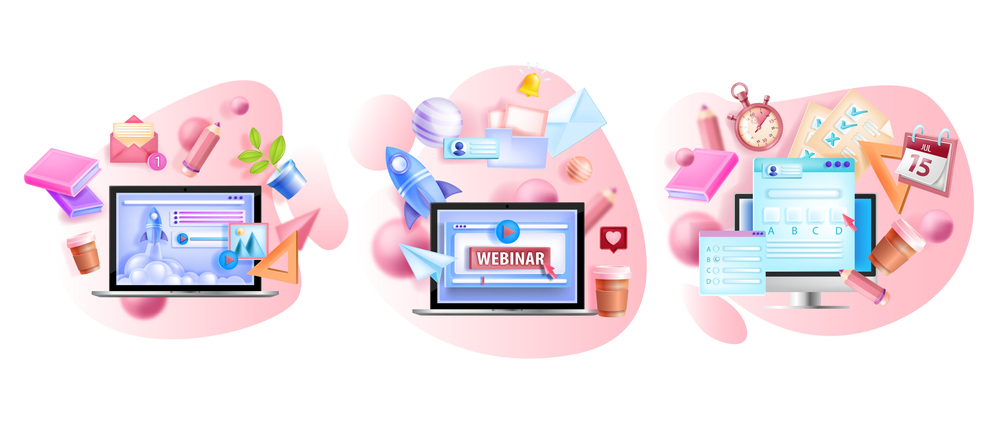Education
Educational software is any type of computer program that has been created for the purpose of education. It includes a wide range of programs, from language-learning software to classroom management systems and reference tools.
All of these software programs were designed to make some aspects or phases of education more effective and efficient. Educational software is not just for children. In fact, some of the most popular programs are designed for use by adults who seek to improve their knowledge in a variety of subjects.
Effects and use of educational software
✅Software that serves as a tutor
Tutor-based education software is defined as software that provides users with the experience of being tutored by a teacher. A study was conducted to determine whether this type of software would improve students’ understanding of material. It found that students who used the mnemonic methods studied less time, but learned more in comparison to those using traditional memorization techniques.
✅Disabled people’s needs
Children with mild disabilities were studied to see how education software affected them. Based on the results, the software assisted these children in learning social skills through team-based learning and discussion, videos, and games.

✅Software evaluation for education
Educational software is used in many schools and homes. The team decided to develop a testing system for educational software, as there was no accepted way of evaluating it.
The study, CEELTES (the Construction of the Comprehensive Evaluation of Electronic Learning Tools and Educational Software), is called that. The software is graded on a point scale in four categories: technical, technological and user attributes; a set of criteria for judging the software’s content and operation; a different set of criteria to judge how well it reflects educational principles or supports learning; a review of how the software is being used by its students and teachers.
Software for Education Technology (EdTech) companies
The Edutech market for robust solutions is worth many billions of dollars. Over $37.8 billion has been invested in educational technology companies between 1997 and 2017 and a striking 62% of that was invested in just the last three years between 2015 and 2017.
EduTech companies are flourishing as they fill new niches by combining hardware and software in innovative ways. Education is a lifelong pursuit, and there’s no limit to the amount or type of information you can absorb. Educational institutions are benefiting from the human desire to learn by installing campus management systems, intellectual apps and interactive games.
If you are looking for EduTech companies to partner with, App radius is a great place to start.
We have had experience with startups developing ideas and implementing plans, including an education website, trying to find apps and software for productivity, and we have discovered a collaborative management tool with technical partners.
Management software for campuses
We strive to make the experience of using management apps like college ERP systems better. Educational startups often struggle to provide their users with a good user experience. They approached us for a campus management system with a good user interface.
System for managing learning (LMS)
Learning management systems (LMS) are a varied group of computerized tools that help administrators manage online courses and programs.
Campus management systems, also known as CMSs or LMSes, play a vital role in helping universities/colleges maintain an online community and keep students updated on their courses. There are many companies making efforts to explore and utilize space.
What are the benefits of using software in education?
It makes studying easier for them, and they can find what they’re looking for more quickly. Teachers can use assessment software to track the progress of their students and identify areas in which they need additional help. It’s also easier for teachers to put together assignments that are tailored to their students’ individual needs, and they can provide their students with more feedback about how well they understand the material. Some assessment software also allows teachers to create tests that are more interactive and engaging than traditional paper-and-pencil tests. Students can answer questions by typing in their answers or drawing them with a mouse, rather than writing out long answers on paper. This can help them learn better because they’re able to see exactly what they got wrong when they miss a question and why it was wrong.
Features of Ideal Educational Software:
✅Easy & Simple GUI.
✅Personalization in the User Interface.
✅Easily edit, add and delete pages in a Word Press website.
✅Integrating learning into the curriculum can be eye-catching and fun.
✅Quality Performance.
✅Synchronizing data between devices is simple and efficient.
✅Data security and intelligent interoperability are crucial for businesses today.

ERP Software Solution for Education Sector
Educational institutions must have access to student information on a regular basis, and this is only possible when the schools can reliably store that data. In many institutions, old-fashioned manual procedures are still in use for important tasks.
Such systems require more time and effort than manual ones; they are also subject to human error, in which case all data would have to be entered again. Surya Informatics Solutions Private Limited provides the best ERP for education management. Integrated management systems make it easier for schools, colleges and universities to avoid wasting resources by plugging any possible misuses. The administration’s perspective is that educational institutes can free themselves from relying on staff and instead rely on an automated system which will give better results at a quicker pace. This automated system ensures that the record-keeping process is not disrupted by changes in staff or shifts in business hours.
The school management system is designed to be flexible and scalable. The system can be configured to meet the needs of any sized educational institute, from small primary schools to large colleges or universities. It has been developed with features that help streamline operations, improve efficiency and increase productivity.
Key Issues and Challenges in the Education Sector
Data management challenges arise when an activity requires the collection and organization of data on a large scale. The education sector is not exempt from the problems that face all sectors.
Storing Data
In order to manage and store data efficiently, it is important not to have too many files.
Sharing Data with Relevant Stakeholders
When data isn’t shared with departments and shareholders who need it, managers are left puzzling over operations.
Real-Time Data Accessibility
If campus organizations are not tracking or monitoring their operations, they have no real-time visibility into those operations.
How ERP Software Helps Your Educational Institute Overcome Challenges
Effective information sharing
ERP software can greatly facilitate the dissemination of information within organizations. We use our data management tools to provide timely and accurate information for students, parents, faculty members—everyone! Our ERP software provides you with a single, integrated system for managing all aspects of your school: student records, financial data, personnel information, etc. You’ll have access to all the information you need in order to make informed decisions about your school and its future.
Easily store student records
Cloud-based educational ERP software can easily preserve data and ensure its security. With a single login, authorized users have immediate access to all of the organization’s information—from student records to financials
